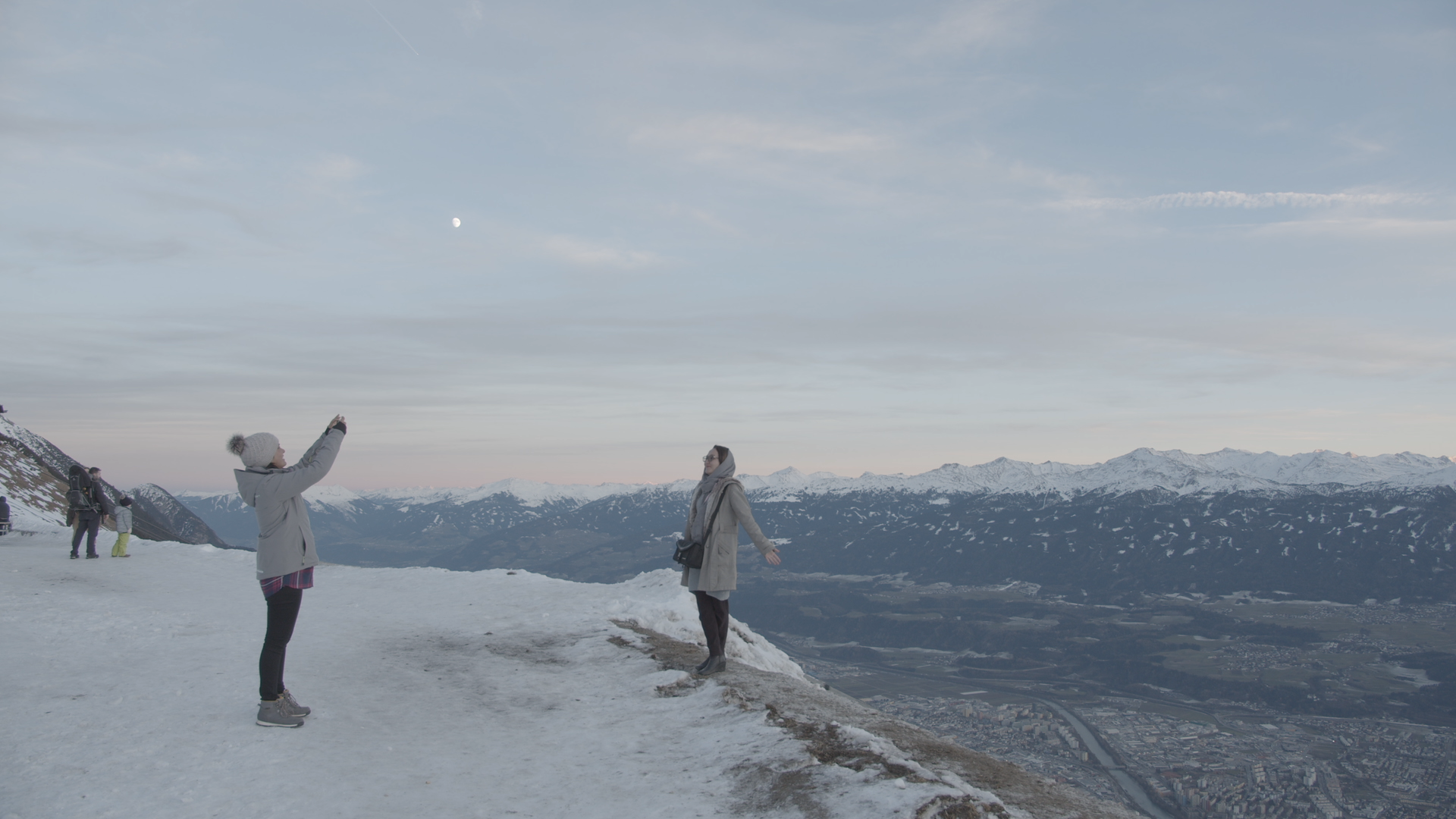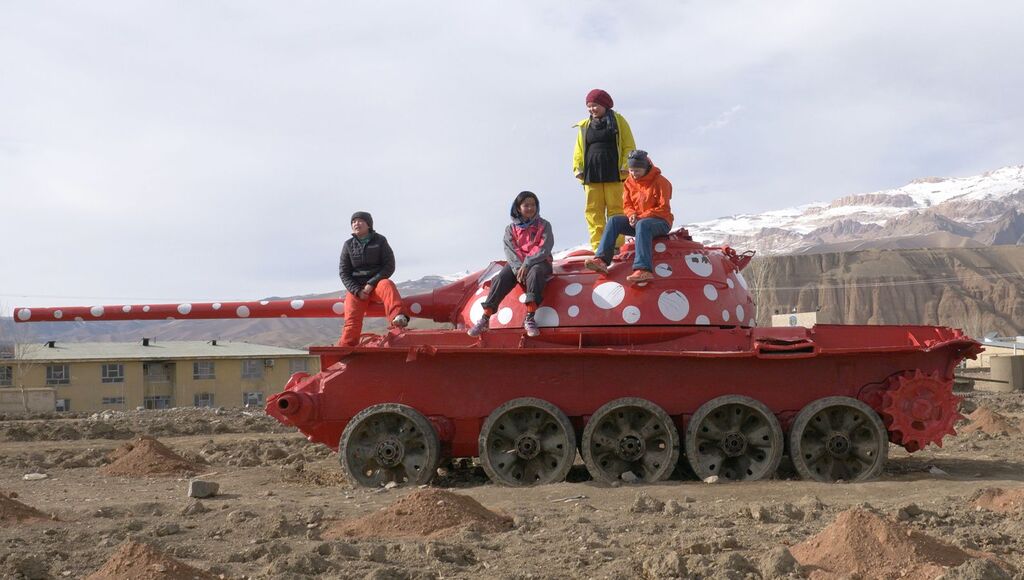A tale of Afghan-European failure

Melting Dreams begins in Bamyan, capital of the eponymous province west of Kabul. A place many will associate with a heinous crime against Afghanistan's cultural heritage. As a reminder, the camera lingers for a moment on the recesses in the cliffside that once contained immense Buddha statues, blown up by the Taliban before the 2001 U.S. invasion. And since October 2021, the Taliban have been back in power in this province too, a cultural centre for the Shia Hazara minority in Afghanistan.
But in this film, completed before the return of the Taliban, the focus is on something quite different, something that flies in the face of what the Taliban stand for: a group of young women training with the Bamyan Ski Club, in the picturesque Afghan mountains at an altitude of 2,500 m. The club was founded in 2011 with Swiss donations; European ski coaches come every year to train Afghan skiers. Haidy Kancler’s initial idea was to film a portrait of fellow Slovenian Ana, one of the coaches working in Afghanistan. But instead, her interest was drawn to the young Afghan women putting their heart and soul into the sport.
So far, so good. Sport in Afghanistan, a dependable selling point. We’ve seen a whole host of films on the subject, some of them enjoying great public popularity. For example, Skateistan: To Live and Skate Kabul, watched by more than a million people. The NGO of the same name is currently trying to restart its projects in the country. The short documentary Learning to Skateboard in a Warzone (If You're a Girl) deals with the same subject matter. Afghan Cycles by Sarah Menzies tells the story of an all-woman cycle team. Skiing has also been featured already: The film Where the light shines accompanies two young men, the first Afghans ever to train for the Olympics.
The films have a similar character, the cinematic appeal of such projects is evident, but not exactly complex: in their "traditional" societal setting, one that is a maze of contradictions, surrounded by breath-taking landscape – from deserts to snow – young Afghans are coached in European sports that have little or no tradition in their home nation. The contrast between the traditional and the modern is both simple and real. But although these films may have been created with brilliance and sensitivity, they always hover rather too closely over the old East-West cliche.
Dreams dissolve like melting snow
Haidy Kancler’s motivation was different. She was fascinated by the young girls and their fearlessness, their undimmed enthusiasm for skiing. "And after all these films, in which a Western perspective on Afghanistan prevails, I wanted to turn things around and capture the Afghan perspective on Western culture," says Kancler. But things don’t always happen the way she – and the protagonists of the film – might have imagined. A story unfolds in which most of the dreams gradually dissolve like "melting snow". Bearing in mind this happened years and months before the Taliban returned to power.
Although this isn’t a film about outstanding sporting achievements, it doesn’t mean that the skiers aren’t highly motivated. In fact, right at the start of the film, we hear one of the protagonists say: "I would one day like to be the first female skier from Afghanistan to take part in the Olympic Games." Together with her friends Fariba and Zakia, Fatima is selected for a European training camp so that she can qualify as a coach. The three women have cut their teeth in the mountains near Bamyan and speed down the slopes with plenty of gusto, but with some awkwardness.
The snowy landscape is magical, but it’s not a properly developed ski resort and there are no lifts. The young women’s families react with cautious concern to the news that their daughters plan to travel to Europe for the project. What about their jobs, their education? They don’t really interfere though; the pride they feel for their children prevails in the end. The Hazara community and its burgeoning civil society has won many freedoms – freedoms that are once again under threat since the return of the Taliban.
What about your fiance, Zakia is asked? Well, he just has to accept it, otherwise he’s not the right person. "Here there are men who say: Islam doesn’t allow it. But in the Koran, it says that we are equal," says the young woman firmly. These women know what they want.
Before the trip, they are warned: "We don’t have a good reputation in Europe – they think we all want to stay there." Fariba jokes with her family: maybe her brother had better fly, after all he really wants to go to Europe? No, says her mother, only my ski champion should go!
Then the big journey begins, one that takes the three to the Stams Ski School, an elite establishment with a promising motto greeting visitors to its website: "Lust auf Leistung" or "Passion for Performance". Shortly after their arrival, the girls have to sign a contract containing pages and pages of conditions; their knowledge of English is limited and they don’t understand much of it.

Culture clash at its very finest
When they’re introduced at the school a short time later, they’re told that their visit is "a fantastic opportunity to get to know another culture".
But the hosts’ capacity to imagine what kind of world their guests have come from is poor. Their guardian and ski instructor Ines asks the other students what they know about Afghanistan: "What do you think, do children in Afghanistan go to school? How are women treated there? Is there snow in Afghanistan too?" The opportunity for cultural exchange quickly becomes an exchange of stereotypes. The girls stand firm: "The situation for women is good now – we can do what we want," they say. But in reality, things aren’t that great. Zakia’s engagement has been broken off. Her fiance didn’t want her to travel, ski, or go abroad.
There is a growing sense of disillusionment at how their ski project is turning out. It starts with a fitness test with disappointing results; their coach’s verdict: you need to build up your muscles for 4-6 months first! The strict training regime at the ski school isn’t right for the three, sometimes they come late and sometimes not at all. "If you’re not punctual there’ll be punitive training!" says their coach Ines, who herself is getting increasingly frustrated.
Suddenly there’s a furore. Fatima and Fariba have disappeared. "I was really frightened," says director Kancler, "I’d assumed responsibility for them." Had the young women planned this all along? Did they just come here to run away? "It’s not that unusual," says co-mentor Ana, "it often happens that individual family members are sent to Europe so that they can send money back and feed the rest of the family."
At this point at the very latest, mutual perception is clouded by nothing but toxic cliches. Zakia appears doubly ashamed – of her friends’ flight and the reaction of the Slovenians.
A short time later, her two friends are picked up by police on the German-Austrian border; they’d travelled there spontaneously with someone they’d met over the Internet. Any remaining trust is finally shattered. Fatima, the instigator of the plan, is sent home, Fariba – who is still under 18 – is allowed to stay for now. "I’m sorry," says Fariba. "It was a spontaneous idea. We wanted to leave Afghanistan behind."

Parable for the West's failure in Afghanistan
Ines can’t get her head around any of it; an attempt to patch things up fails. The cultural exchange becomes a culture clash at its very finest. Ines is annoyed that the girls aren’t better at fitting in, that they don’t make an effort to get the skiing qualifications they want. Normally, ski students train six hours a day for it, but in their case, they’re done after one-and-a-half hours at most, she says. "But if I went to Afghanistan, I’d have to fit in, wouldn’t I?? Wouldn’t I have to wear a veil?" An excursion to a local church produces the earth-shattering insight: "You have the Koran, and we the Bible."
Contact with other students is polite, but distanced. The Afghan women withdraw and isolate themselves from the group. They feel rejected and express those feelings: the people here are terribly unfriendly; things are so much better back home. The joy they once felt when skiing is long gone. Zakia’s mood worsens and suddenly she’s the next one to disappear. And stays that way, there’s no trace of her, no sign of life. The Europe trip ends in disaster. Fariba has to return home now too. She receives a limp printed certificate, then takes the next plane.
"You can probably view this film very differently, according to whom you identify with," says director Kancler. She doesn’t see her protagonists as victims, but as actors bearing their own responsibility for their failure. The cultural misunderstandings, the broken trust – looking back over recent months, the whole film appears like a parable of Europe’s entire political engagement in Afghanistan. At the point of crisis, both sides were disappointed: the Afghans, that they have been left to fend for themselves at the worst possible time; the Europeans, that the government and its army, built up over many years, surrendered to the Taliban with barely any resistance.
It should be mentioned that the film was shot between 2017 and 2019, and completed in 2021, so before the return of the Taliban and the end of the international presence in Afghanistan. In October 2021, the Taliban also came back to Bamyan. "I was of course very upset when the Taliban seized power," says Kancler. She was extremely concerned for all the people she met there whilst filming. "Fatima and Fariba were able to leave Afghanistan. But it also makes me feel very sad that they’ve left their homeland," says the director. Since the Taliban return, freedoms have been curtailed, in Bamyan as elsewhere. The Bamyan Ski Club was has closed, but there are efforts to maintain educational offerings, in particular for girls and women, even under the most challenging conditions. The future remains uncertain.
© Qantara 2022
Translated from the German by Nina Coon
